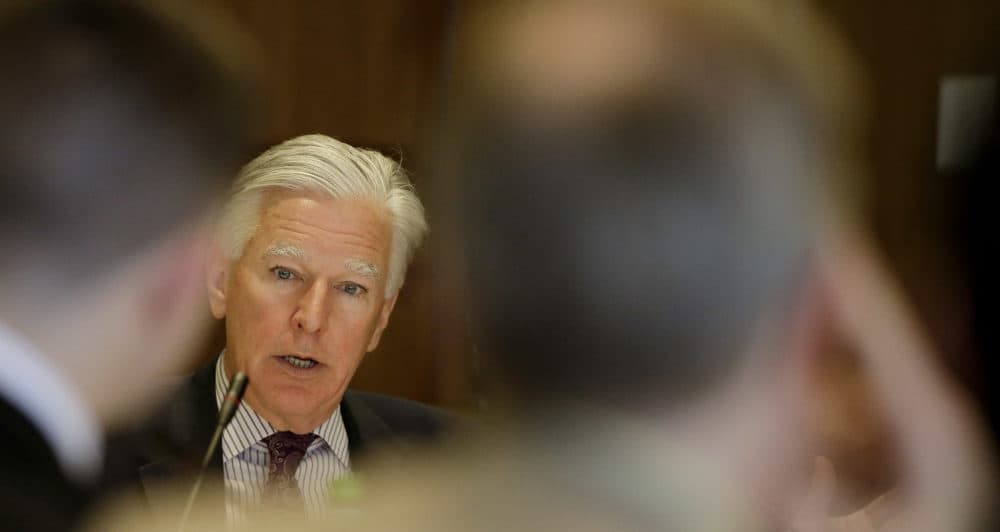Advertisement
Commentary
At UMass, We Need The Kind Of Leadership Money Can't Buy

Reading through the Boston Globe’s recent story on last year’s 100 highest-paid Massachusetts state employees, my first response, like many readers, tended towards outrage.
UMass President Marty Meehan brought in a whopping $659,167.99 (plus generous fringe benefits)? Dozens of UMass upper administration paid over $300,000? Even as tuition and student fees continue to rise?
As a non-tenure track faculty member at UMass Boston, I am no stranger to the inequities of our UMass system. I know devoted faculty and staff who are working full-time for a meager $40,000 per year — and adjuncts making much less than that.
But reading through the comments to the “Top 100,” I felt my immediate outrage turning to an uneasiness of a different sort.
Again and again, the comments beneath the story took aim not just at top-heavy salaries but at UMass more broadly, swiping at the very idea of publicly-supported higher education:
“The more we give them, the more they spend, on themselves,” said one commenter.
Another joked: “The list doesn’t get down to the janitors at UMass. They’re only making $250,000.”
“Think about these salaries the next time the pols ask for another tax increase,” one reader suggested.
So much for our liberal self-image as a pro-education state.
But if revulsion at the state university system’s highest salaries leads readers to oppose further state funding for public higher education that would be a terrible irony.
For though it may seem paradoxical, mushrooming upper administration salaries are in fact not a sign of Massachusetts pouring too much public money into higher education, but the opposite. In fact, it’s a sign of the increasing privatization of our public higher education system, brought on by a decades-long erosion in state support.
Currently, according to the Massachusetts Budget and Policy Center, Massachusetts ranks a paltry 36th in the nation in terms of per-student state funding for public higher ed. And when it comes to our support of public higher ed as a percentage of total taxable income — ours being a wealthy state and all — Massachusetts ranks an abysmal 45th. So much for our liberal self-image as a pro-education state.
Advertisement
It has not always been this way.
When UMass Boston opened in 1965, tuition cost just $200 per year (approximately $1,594 in 2019), largely because the state was picking up 80 percent of the tab. Now, in-state tuition at UMB stands at close to $14,000, a nine-fold increase after inflation, largely because the state is only paying 22 percent. Since just 2001, a $5,100 reduction in per-student state funding has led to a $5,600 rise in tuition.
No wonder 75 percent of public higher ed students are graduating with debt averaging over $30,000, almost as much as their peers at private schools. Many students are deterred from pursuing the degrees of their dreams altogether by the threat of such debt.
The leading driver of this skyrocketing tuition is the decline in state funding for public colleges and universities. We cannot blame this on executive pay alone.
In fact, indirectly this public disinvestment explains the mushrooming of upper administration, too.
For as the share of UMass expenses born by the state has declined, the UMass system has been compelled to compete with private colleges and universities for wealthier and out-of-state students, federal grant money, and corporate partnerships, desperately seeking ways to attract private dollars where public support used to be. And new “competitive initiatives” often warrant new executive hiring.
Is it so surprising that, forced to compete with the privates, UMass has taken on some of their questionable practices — including reliance on high-paid executive experts charged with developing marketing strategies, costly campus amenities, secretive real estate deals and private fundraising?
... lavish salaries cut folks at the top off from those they are bound to serve: students, staff, faculty and community.
The problem is not that the public is giving too much support to UMass. The problem is rather that a lack of public support is forcing UMass to behave more like the privates, (where, to be fair, executive salaries still dwarf those at public schools).
And this brings me to my closing point, and to the real reason that, while rejecting misguided attacks on public higher education, I actually would like to see those top UMass admin salaries brought down to earth. (After all, President Meehan's salary, after accounting for inflation, is now roughly triple what his predecessor received in 1990.)
For the danger, as I see it, is that such lavish salaries cut folks at the top off from those they are bound to serve: students, staff, faculty and community. I fear such salaries make our higher ed leaders too comfortable with the current state of things to take up the real fight: to make public higher education public again.
We need leadership willing to challenge the long-standing status quo of state disinvestment, not just adapt to a new privatized “reality.” We need leadership that can awaken the conscience of our commonwealth by contrasting our pro-education values with our austerity budgets, reframing education as a public good. We need leadership that puts students first, and is committed to making top-notch higher education accessible to all of them.
Now that’s leadership I’d be willing to pay top dollar for. But the irony may be that you don't get such leaders by paying for them.
Joseph G. Ramsey is a member of the Save UMB Coalition, an elected executive committee member of the Faculty Staff Union (FSU/MTA).
